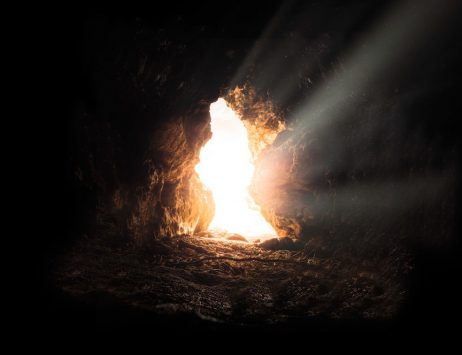On the first Sunday of Lent this year, we hear from the gospel of Mark (1:12-15) what happens to Jesus after His baptism. Read it here:
Immersed in the Jordan River, soaked in the Holy Spirit flung through the heavens by the Father who cries out His delight, Jesus is hurled immediately by the same Holy Spirit into the wilderness. He remains for 40 days.
Many of us view Lent, our 40 days in the desert, as a time of spiritual growth. We give things up to grow stronger. We form better habits to become better people. And maybe there’s nothing wrong with this.
But Jesus didn’t go into the desert to become stronger or more self-sufficient. The Spirit led Him into the desert simply to be who He was, without adornment, without excess. Empty-handed, without food or comfort or something to entertain Him, Jesus accepts the world as He finds it.
Mark’s account of Jesus’s time in the wilderness is sparse. Unlike Matthew and Luke, Mark shows no interest in the content of Jesus’s temptations or His dialogue with Satan. He simply tells us that Jesus was tempted. “Tested” might be a better word. As the rebellious angelic overlord of a fallen cosmos, Satan needed to know what he was up against. And so he put Jesus to the test.
What was the test? Mark gives us a clue. “He was among wild beasts, and the angels ministered to him.” Jesus faces ravenous animals, born in a world of scarcity, where there is never enough and in which only the strongest have enough to survive. But He also faces the solicitude of angelic spirits, who demand nothing from Him, who give without asking anything in return.
This is Jesus’s test. He must dwell in a world of beasts and angels. Competing with the wild beasts there is never enough food or enough safety. Among the angels, Jesus can freely receive food that was never grown or harvested or cooked. Can He learn to live with animals and angels without attacking the one or clinging to the other? Can He live in peace? Only if He holds on to the truth: God alone is enough. God alone is self-sufficient. God alone dwells in perfect peace.
Like all of us, Jesus has moments of fulfillment and moments of emptiness. His time in the desert is a foretaste of the final years of His life. He faced times of success, of exquisite victory over the evils of the world. Jesus also faced times of rejection, of not seemingly being enough to win over the hearts of His people. In the midst of these experiences, He remains faithful to His mission: to proclaim “the time of fulfillment,” the time in which God alone is enough and can be trusted to provide all that we need.
Lent asks us to dwell amidst our beasts—internalized voices of accusation, skepticism, self-doubt, and our angels—voices of self-promotion, grandiosity, inflation. In the desert, caught between the hunger of ravenous animals and the generosity of angels, Jesus shows us what it’s like to be tossed between the illusions of “enough or “not enough.” Between “I can’t do this, I don’t have what it takes, I am not enough” and “I am strong, I have everything I need, I am enough.”
Instead of spiritual strength training, these 40 days can be a time for learning to accept the basic ambiguity of these experiences with openness and trust. The test is our temptation to get caught up in the unending drama between the beasts and the angels. Will I obsess over deciding whether I am enough or not? Will I expect my experiences to settle things one way or another? Or will I accept experiences of being enough and not being enough simply as they arrive?
The desert reveals that both are true at one time or another. The desert reveals that neither one is the final truth. Accepting this, we can learn to dwell peacefully amidst our beasts and angels, proclaiming the coming of the One who alone is enough.



